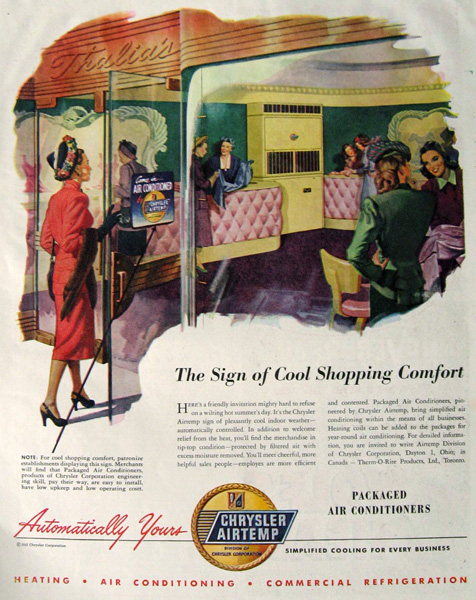This week I came across a fascinating working paper on air conditioning in schools by Joshua Goodman, Michael Hurwitz, Jisung Park, and Jonathan Smith. Using data from ten million students, the authors find a relationship between hotter school instruction days and lower PSAT scores. They also find that air conditioning offsets this problem, but students of color in lower income school districts are less likely to attend schools with adequate air conditioning, making them more vulnerable to the effects of hot weather.
Climate change is a massive global problem, and the heat is a deeply sociological problem, highlighting who has the means or the social ties to survive dangerous heat waves. For much of our history, however, air conditioning has been understood as a luxury good, from wealthy citizens in ancient Rome to cinemas in the first half of the twentieth century. Classic air conditioning ads make the point:


This is a key problem for making social policy in a changing world. If global temperatures are rising, at what point does adequate air conditioning become essential for a school to serve students? At what point is it mandatory to provide AC for the safety of residents, just like landlords have to provide heat? If a school has to undergo budget cuts today, I would bet that most politicians or administrators wouldn’t think to fix the air conditioning first. The estimates from Goodman and coauthors suggest that doing so could offset the cost, though, boosting learning to the tune of thousands of dollars in future earnings for students, all without a curriculum overhaul.
Making such improvements requires cultural changes as well as policy changes. We would need to shift our understanding of what air conditioning means and what it provides: security, rather than luxury. It also means we can’t always focus social policy as something that provides just the bare minimum, we also have to think about what it means to provide for a thriving society, rather than one that just squeaks by. In an era of climate change, it might be time to rethink the old cliché, “if you can’t stand the heat, get out of the kitchen.”
Evan Stewart is an assistant professor of sociology at University of Massachusetts Boston. You can follow his work at his website, or on BlueSky.
Comments 23
Shylier — June 15, 2018
I believe that the relationship between air conditioned class rooms and PSAT scores is a clear representation of the social classes in America. The higher your social class the better learning environment your able to be put in which allows you to focus more on the material being taught instead of your enviroment.
Sarah Brown — February 28, 2019
Great article. Thanks thesocietypages.org
Kristen Brown — March 2, 2019
Climate change is a burning question now in term of setting social policy. As world temperature is increasing rapidly, the cooling system like AC is not a luxury now. Many articles have been written concerning this social policy changing. I have also written several times being a freelance writer. Here is the blog link to know more about me. In fact, it is high time to be concern about this global issue. We have to cope with this social change.
Edmond Lundquist — May 5, 2020
Hello! I am a student in college. I have a fun life full of adventure. and I can’t find the time to write an essay. for me it’s boring and uninteresting. but the curriculum must be completed. so I turned to https://pro-papers.com for help. they did everything at the highest level! I was satisfied, the writers know their job and do it well.
Edmond Lundquist — May 5, 2020
Hello! I am a student in college. I have a fun life full of adventure. and I can’t find the time to write an essay. for me it’s boring and uninteresting. but the curriculum must be completed. so I turned to pro-papers.com/assignment-writing-service
for help. they did everything at the highest level! I was satisfied, the writers know their job and do it well.
Jacob james — June 17, 2020
Today lots of problems faced by those students who are studying in schools in which they're fewer facilities and an incompetent environment for study. These types of social work and platform help to enlighten these issues. Because a proper environment is a necessary thing to educate the incoming generation. The health and wellness tips for college students also help students to solve their issues. The https://www.healthstatus.com/health_blog/wellness/five-health-and-wellness-tips-for-college-students is one of major platform which works for the welfare of students.
Amy Carter — July 10, 2020
Nice article! I also like to read http://essaypapers.reviews/
Marianna Lee — February 8, 2021
It is not only a long process https://essaywritersllc.com/, but each part is seemingly more difficult than the last, and you have to find a way to make it all come together at the end.
engfinity — March 14, 2021
ok thanks https://wm365.bet/
appearancerabid — June 22, 2022
My daily routine is jam-packed with exciting experiences. and I'm unable to compose an essay. It's dull and uninteresting to me. There must be a final exam. so I turned to quordle Everything was done to the greatest standard! I was pleased with the quality of the writing.
game — July 11, 2022
It's great to be here with everyone, I have a lot of knowledge from what you share, to say thanks, the information and knowledge here helps me a lot. foodle
Eddie Nelson — March 15, 2023
The duotrigordle is a more difficult Wordle alternative that Wordle fans who like a challenge will like.
Gyani Pandit — April 10, 2023
Nowadays our school policy is totally different we must focus on online education.
lily167 — August 12, 2023
I am thrilled to have discovered this helpful website. It provides me with a great deal of interesting information about everything, notably the content of the preceding article. capybara clicker game
Nancy K. — September 28, 2023
Now if only we could could our eco-friendly air conditioners to run on solar power, we'd really be making a difference. Shot out to www.solarpowertoronto.com for making my home cool and eco-friendly in the summer!
Sanahan1 — January 22, 2024
waffle game is a game you can play whenever you want right in the browser. The rules of the game are very simple: You just need to use the given characters. Change them so that they link together to make meaningful words. Moreover, the waffle has suggestions for you with colors including, dark orange, light orange and original color
Ryan Jacob — February 20, 2025
The article highlights the importance of air conditioning as a necessity, retro bowl, not just a luxury.
Jonn — June 29, 2025
Daily CircO2 boosts nitric oxide, supporting energy, brain clarity, and circulation.
kashif kashif kashif — July 24, 2025
Easily this page will probably irrefutably possibly be well known involving many blogs persons, car without any conscientious articles or blog posts or maybe opinions. 비아그라 구매
kasif sofeyn kasan — July 25, 2025
I’ve been wondering about the similar factor myself lately. Delighted to see an individual on the same wavelength! Nice write-up. nowgoal
creepy dates — October 27, 2025
This research really highlights how environmental comfort affects learning outcomes - it's like those uncomfortable Creepy Dates where you can't focus on anything because you're too distracted by your surroundings!
Incredibox Unforgiven — October 27, 2025
The intersection of climate change and educational equity is fascinating - it reminds me how environmental factors can make or break any experience, whether it's trying to learn in a sweltering classroom or navigating through those awkward Incredibox Unforgiven where the temperature just feels wrong!
My Little Pony test — January 9, 2026
This My Little Pony test is perfect for fans who want a quick quiz with a detailed and surprisingly thoughtful personality result.